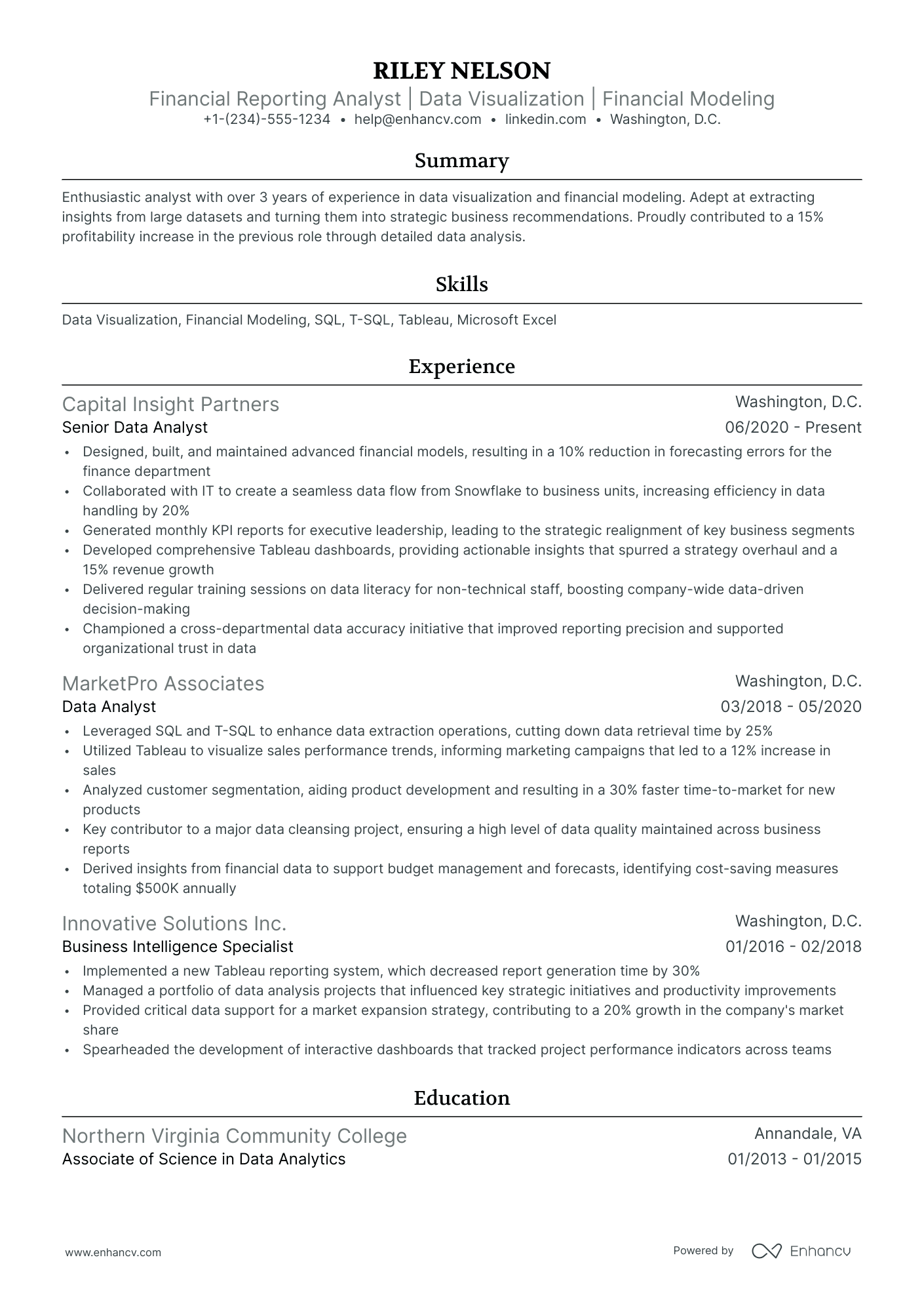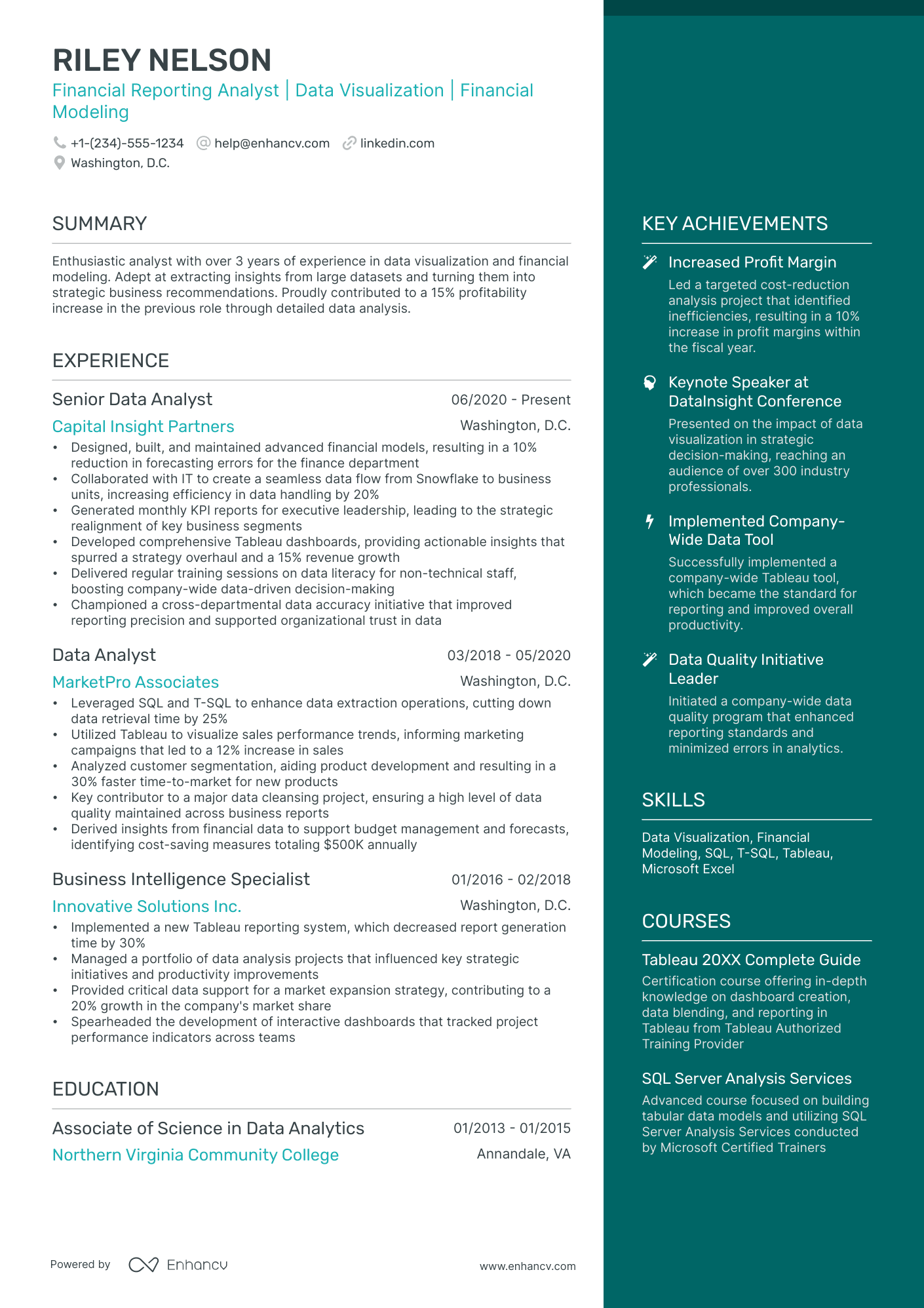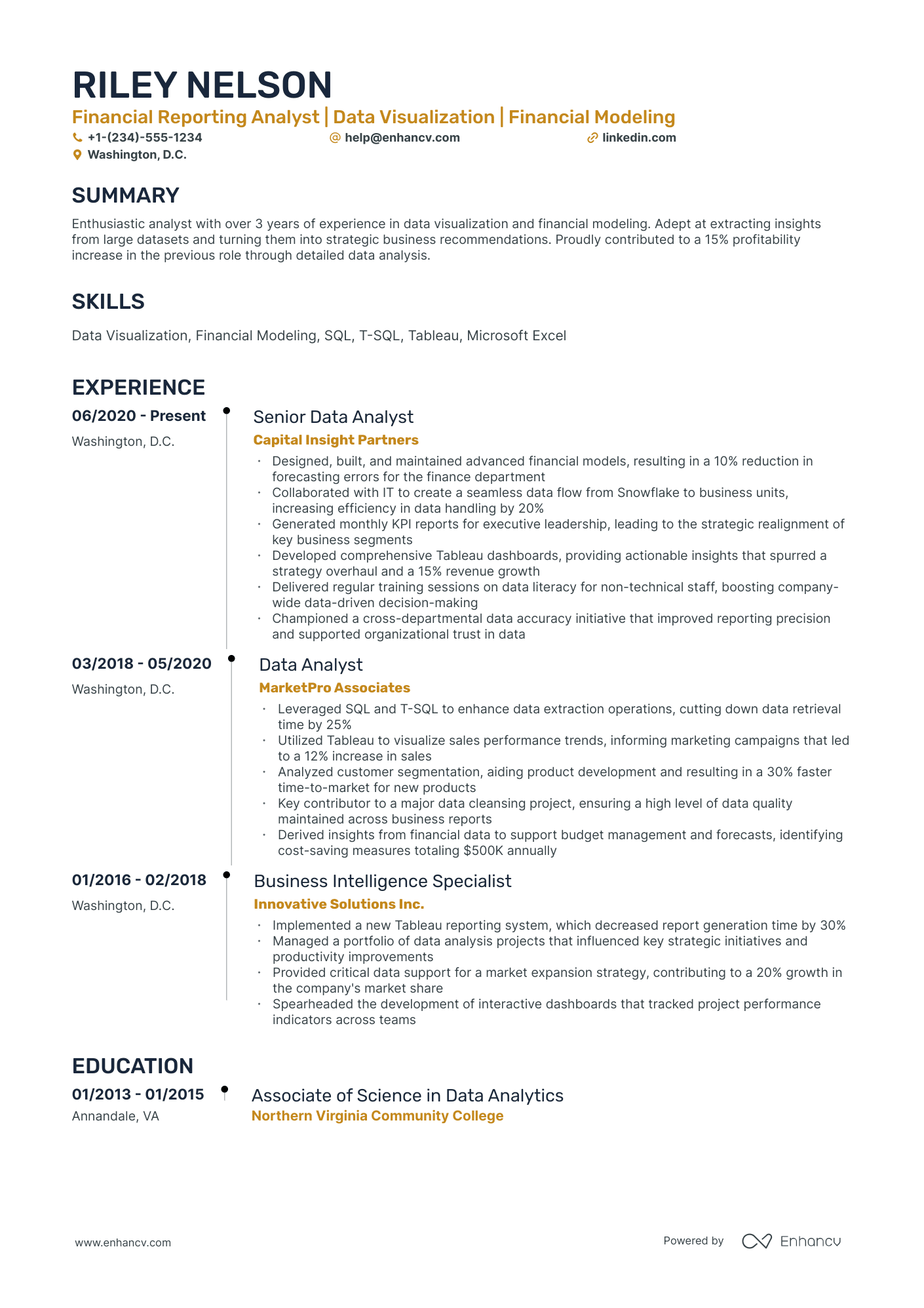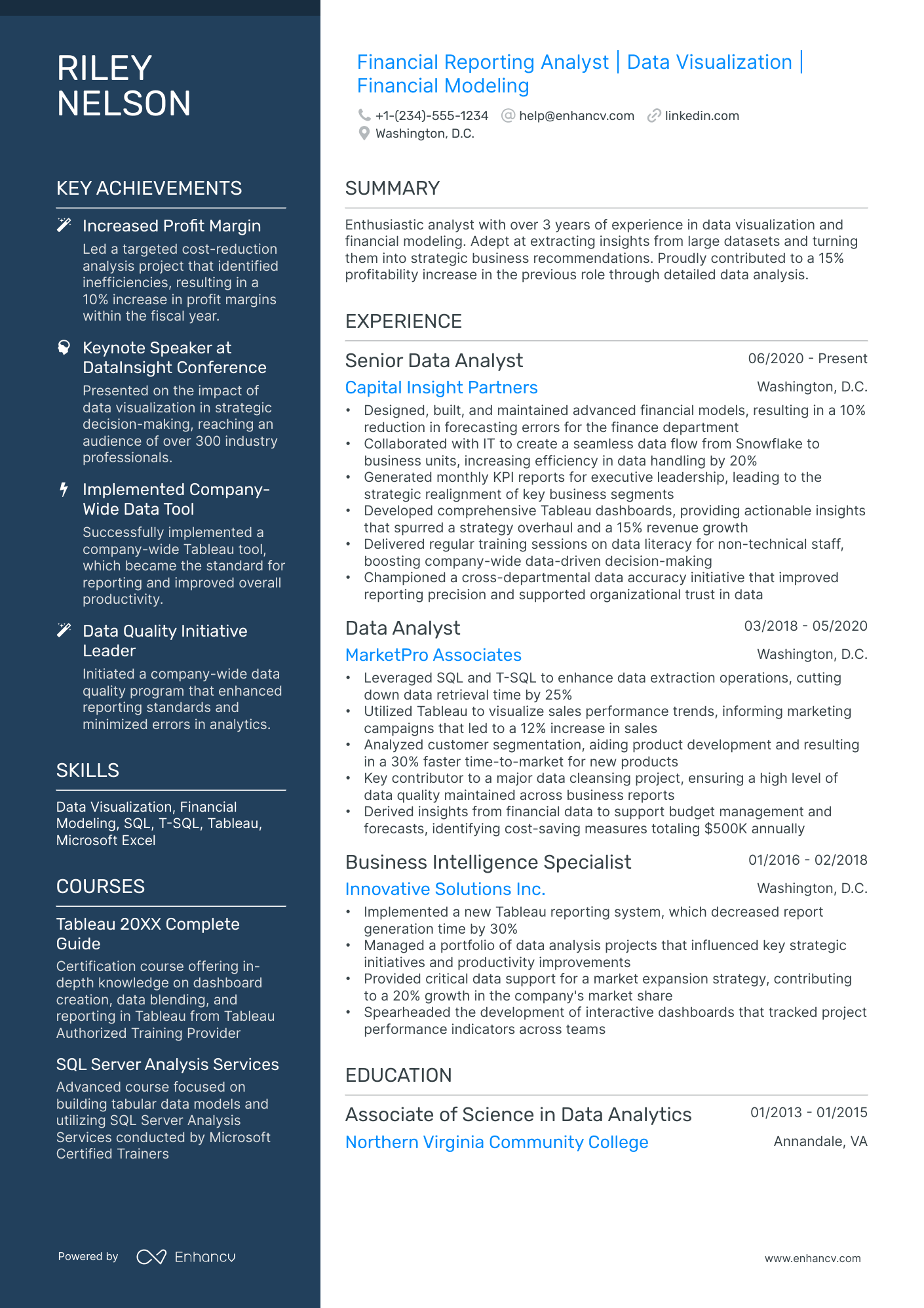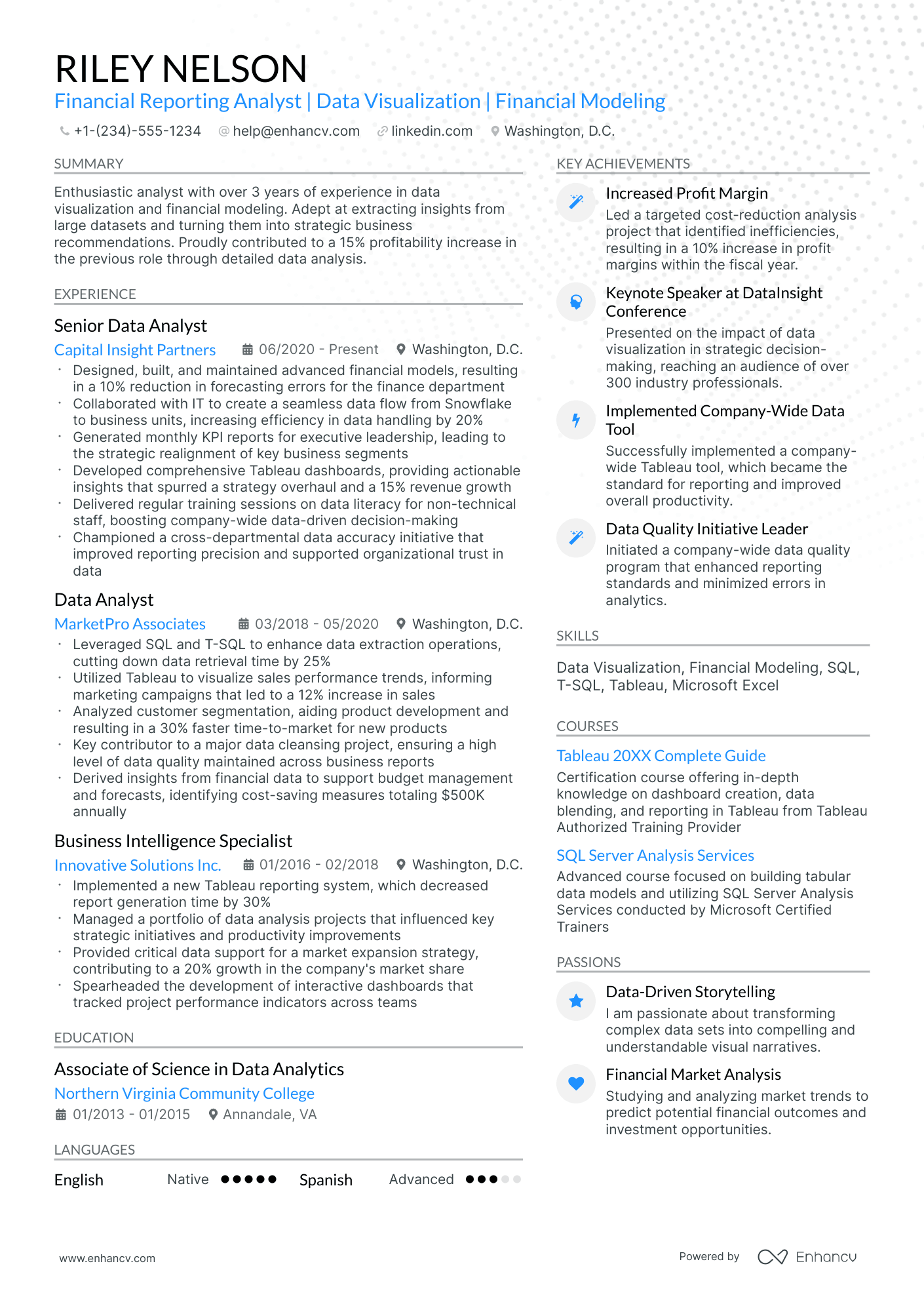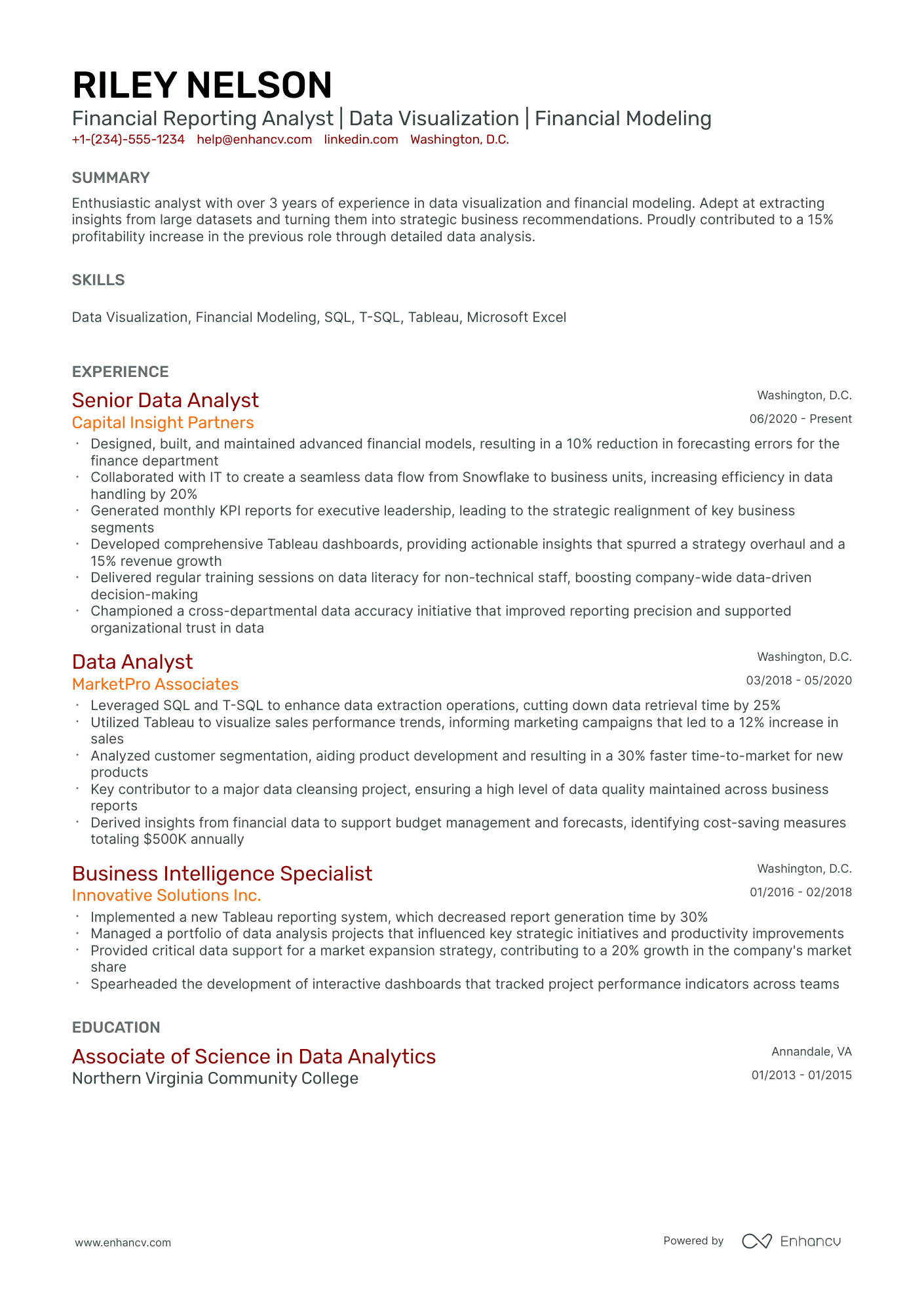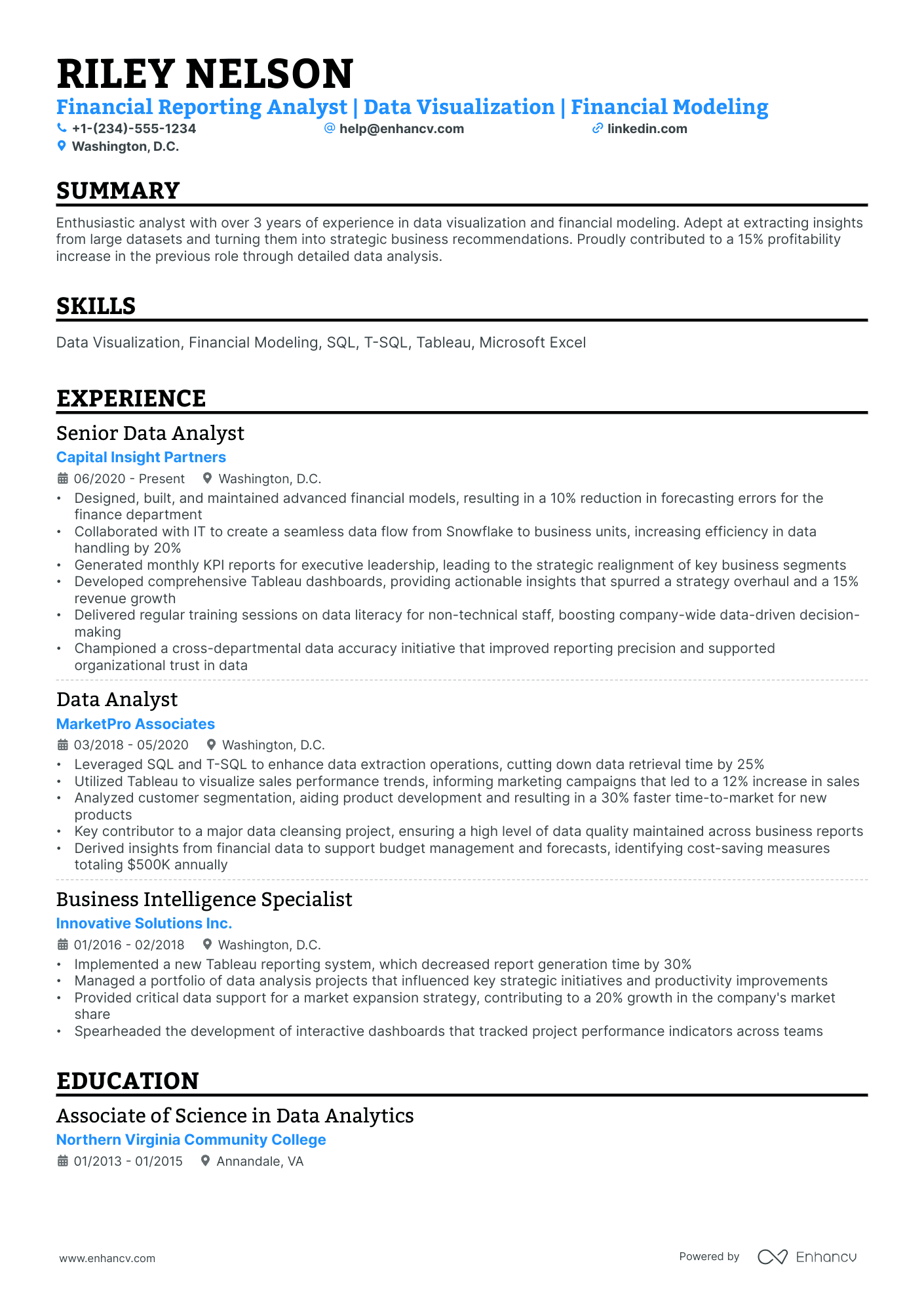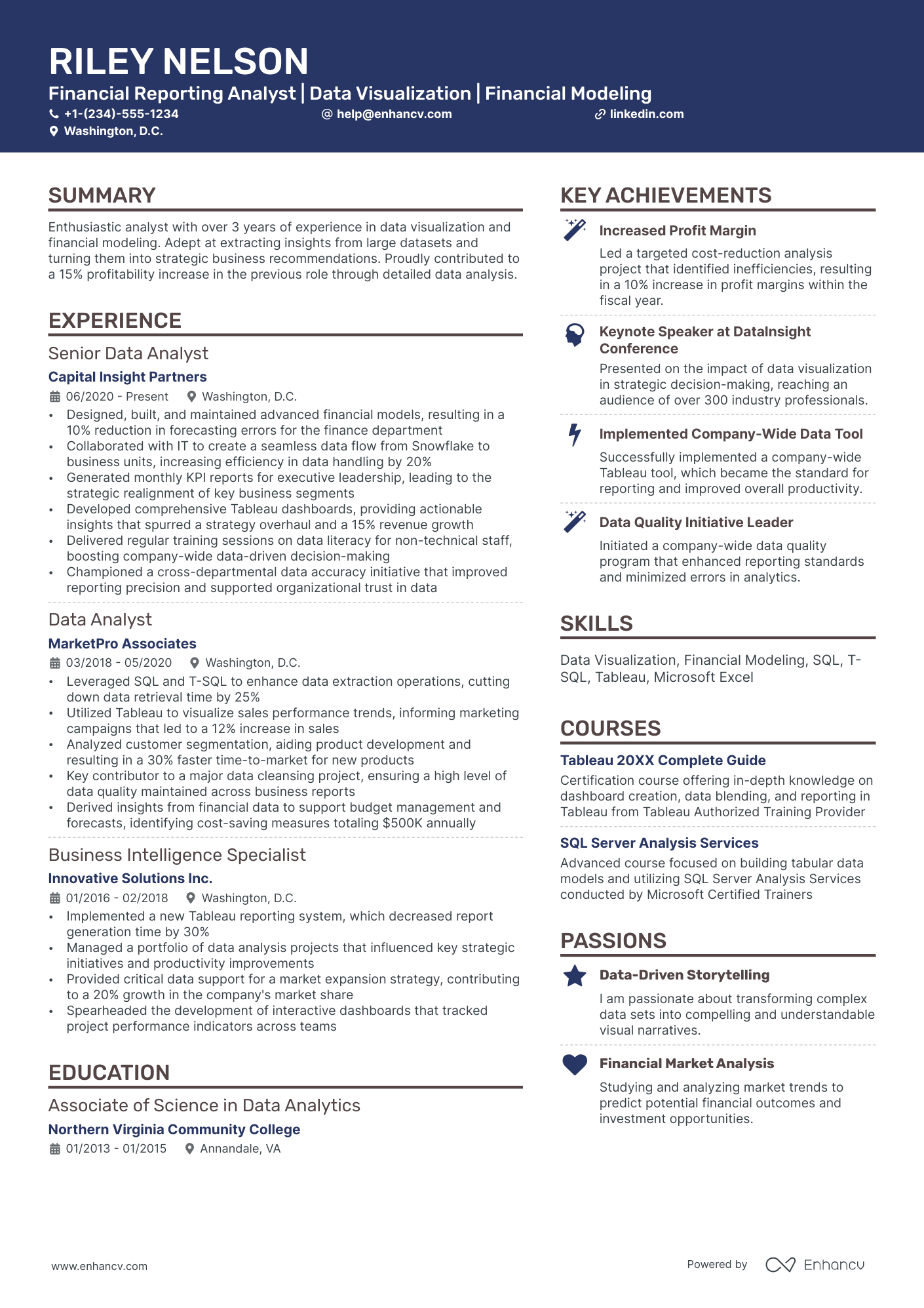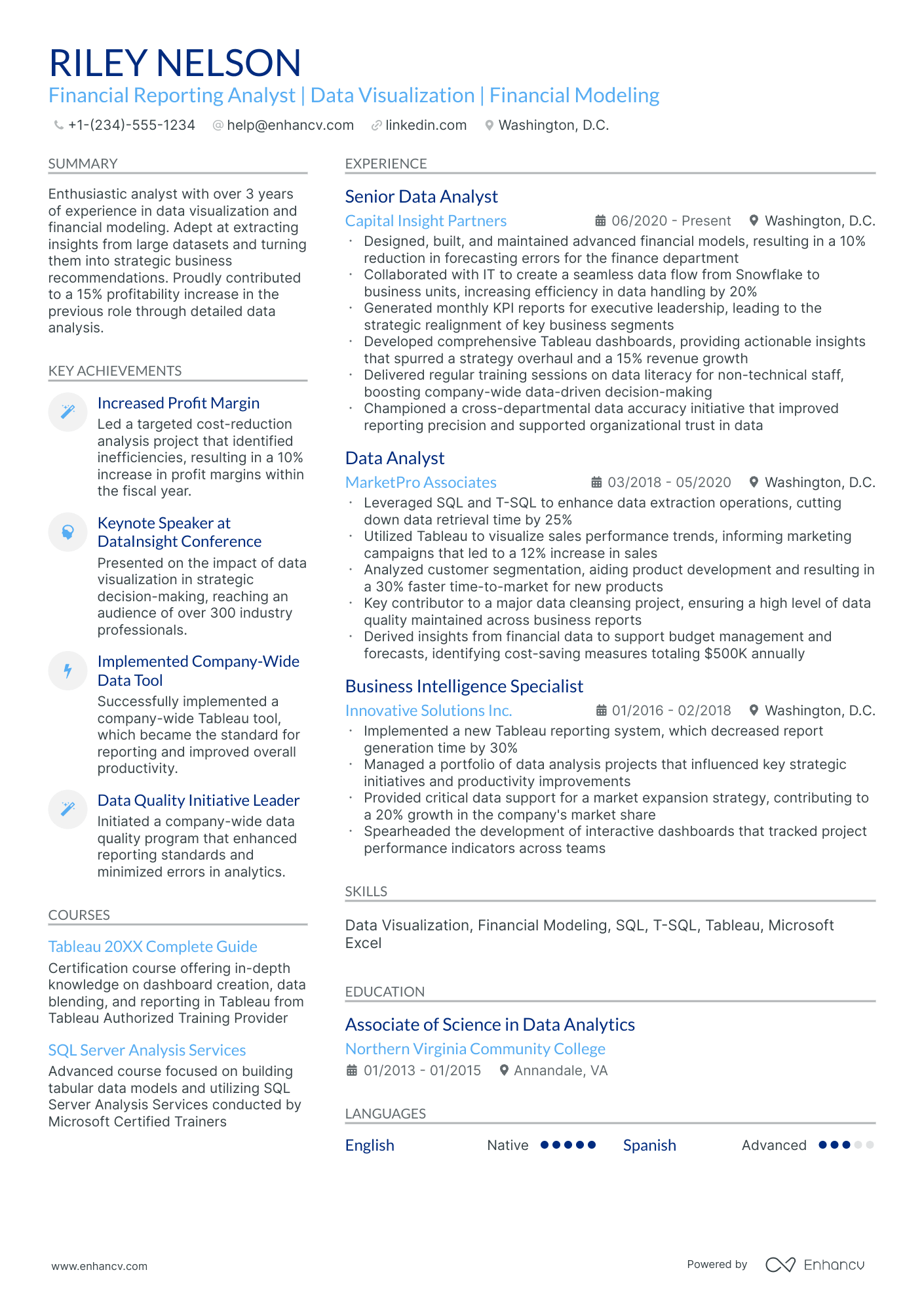Many financial reporting analyst resume drafts fail because they bury results under task lists and generic accounting language. That matters when an ATS filters keywords and recruiters scan in seconds in a crowded applicant pool. If you're unsure where to begin, learning how to write a resume that communicates value is a critical first step.
A strong resume shows what you improved and delivered, not just what you used. You should highlight faster close cycles, fewer audit adjustments, clean filings, tighter variance analysis, and dashboards that improved forecast accuracy. Quantify scope, deadlines met, and stakeholder impact.
Key takeaways
- Quantify close cycle time, reporting accuracy, and audit outcomes in every experience bullet.
- Tailor resume language to match each job posting's tools, standards, and compliance priorities.
- Use reverse-chronological format for experienced analysts and hybrid format for career switchers.
- Anchor every listed skill to a specific project, deliverable, or measurable result.
- Place certifications like CPA or CMA near education to strengthen credibility fast.
- Write a three- to four-line summary featuring your title, tools, domain, and top achievement.
- Use Enhancv's Bullet Point Generator to turn vague duties into recruiter-ready, metric-driven bullets.
How to format a financial reporting analyst resume
Recruiters evaluating financial reporting analyst candidates prioritize technical proficiency in reporting frameworks (GAAP, IFRS), ERP and consolidation tools, and the ability to translate complex financial data into accurate, timely reports. A clean resume format ensures these signals—along with analytical rigor and attention to detail—surface quickly during both automated screening and manual review.
I have significant experience in this role—which format should I use?
Use a reverse-chronological format to present your deepest and most relevant financial reporting experience first. Do:
- Lead with your most recent role and clearly define your reporting scope—entity count, jurisdictions, consolidation complexity, and stakeholder audience.
- Highlight proficiency in role-specific tools and domains such as SAP, Oracle HFM, Workiva, BlackLine, SEC filing, and intercompany eliminations.
- Quantify outcomes tied to reporting accuracy, cycle time reduction, audit findings, or process improvements.
- "Streamlined the monthly consolidated close process across 12 entities in three currencies, reducing reporting cycle time by four days and eliminating two recurring audit adjustments worth $1.2M."
I'm junior or switching into this role—what format works best?
A hybrid format works best, letting you lead with core financial reporting skills while supporting them with relevant experience or project work. Do:
- Place a skills section near the top that highlights technical competencies such as Excel modeling, ERP navigation, GAAP compliance, and variance analysis.
- Include academic projects, internships, or cross-functional assignments where you performed reconciliations, prepared financial schedules, or supported close processes.
- Connect every action to a measurable or observable result to demonstrate analytical impact.
- Advanced Excel (skill) → built a dynamic variance analysis template for monthly P&L review (action) → reduced manual reporting errors by 30% and cut review time by two hours per cycle (result).
Why not use a functional resume?
A functional format strips away the timeline and context that hiring managers need to verify your hands-on reporting experience, making it harder to assess your readiness for real close cycles and compliance deadlines.
- A functional resume may be acceptable if you're transitioning from a related field like audit or accounting and lack direct reporting analyst titles—but only if every listed skill is anchored to a specific project, deliverable, or measurable outcome.
Once you've established a clean, readable format, the next step is deciding which sections to include and how to arrange them for maximum impact.
What sections should go on a financial reporting analyst resume
Recruiters expect to see that you can produce accurate, compliant financial statements and explain results clearly. Understanding what to put on a resume for this role ensures you include the right components.
Use this structure for maximum clarity:
- Header
- Summary
- Experience
- Skills
- Projects
- Education
- Certifications
- Optional sections: Awards, Publications, Languages
Strong experience bullets should emphasize measurable impact, reporting scope, accuracy improvements, close timelines, and compliance outcomes.
Is your resume good enough?
Drop your resume here or choose a file. PDF & DOCX only. Max 2MB file size.
Once you’ve organized your resume with the right components in place, focus next on writing your financial reporting analyst resume experience section to show how you’ve applied them in your work.
How to write your financial reporting analyst resume experience
Your experience section should demonstrate financial reporting work you've shipped—reconciliations completed, reports delivered, close processes improved—using the specific tools, standards, and methods that define the role. Hiring managers prioritize demonstrated impact over descriptive task lists, so every bullet should connect what you did to a measurable outcome. Building a targeted resume for each application ensures your experience section speaks directly to what the employer needs.
Each entry should include:
- Job title
- Company and location (or remote)
- Dates of employment (month and year)
Three to five concise bullet points showing what you owned, how you executed, and what outcomes you delivered:
- Ownership scope: the reporting cycles, financial statements, ledger systems, regulatory filings, or business units you were directly accountable for as a financial reporting analyst.
- Execution approach: the tools, frameworks, and standards you applied—such as ERP platforms, consolidation software, GAAP or IFRS guidelines, variance analysis techniques, or automation workflows—to produce accurate and timely financial reports.
- Value improved: the specific gains you drove in reporting accuracy, close-cycle speed, audit readiness, data reliability, compliance posture, or process efficiency within the financial reporting function.
- Collaboration context: how you partnered with accounting teams, external auditors, FP&A, tax, treasury, or business unit leaders to align reporting outputs with organizational and regulatory requirements.
- Impact delivered: the concrete results your work produced, expressed through improvements in timeliness, error reduction, stakeholder confidence, regulatory compliance, or decision-support quality rather than routine activity.
Experience bullet formula
A financial reporting analyst experience example
✅ Right example - modern, quantified, specific.
Financial Reporting Analyst
NorthBridge Software | Austin, TX
2022–Present
Publicly traded software company serving 3,000+ mid-market customers across North America.
- Led month-end close for revenue and operating expense reporting in NetSuite and Workday, cutting close cycle time from seven to five business days while maintaining zero late SEC filing risk.
- Automated recurring variance analysis and flux commentary using Excel Power Query, Power Pivot, and SQL extracts, reducing manual reconciliation time by 35% and improving forecast-to-actual accuracy by 2.1 percentage points.
- Prepared quarterly Form 10-Q and annual Form 10-K financial statement tie-outs in Workiva, strengthening XBRL tagging and disclosure controls and reducing external audit adjustments by 40% year over year.
- Built and maintained KPI dashboards in Power BI for finance leadership, standardizing revenue bridge and margin reporting and decreasing ad hoc reporting requests by 25% across five stakeholder groups.
- Partnered with revenue operations, FP&A, and external auditors to remediate three SOX (Sarbanes-Oxley) control gaps, implementing documented review workflows and raising control pass rate from 92% to 99% in one testing cycle.
Now that you've seen how a strong experience section comes together, let's look at how to customize yours for each specific job posting.
How to tailor your financial reporting analyst resume experience
Recruiters evaluate your financial reporting analyst resume through applicant tracking systems and manual review, scanning for alignment with the job posting. Tailoring your resume to the job description by mirroring the specific language and priorities in each listing increases your chances of passing both filters.
Ways to tailor your financial reporting analyst experience:
- Match ERP platforms and reporting tools listed in the job description.
- Mirror the exact compliance standards like GAAP or IFRS referenced.
- Align your reconciliation and close process language with the posting.
- Reflect specific KPIs or financial accuracy benchmarks the role prioritizes.
- Highlight variance analysis methods that match stated reporting workflows.
- Include industry experience relevant to the company's sector or market.
- Emphasize SOX compliance or internal controls work when the role requires it.
- Reference cross-functional collaboration with audit or accounting teams mentioned.
Tailoring means aligning your real accomplishments with what the role demands, not forcing disconnected keywords into your experience bullets.
Resume tailoring examples for financial reporting analyst
| Job description excerpt | Untailored | Tailored |
|---|---|---|
| Prepare monthly, quarterly, and annual financial statements in compliance with US GAAP, ensuring accuracy and timely submission to senior leadership. | Helped prepare financial documents and reports for management review. | Prepared monthly, quarterly, and annual financial statements under US GAAP, delivering all submissions to senior leadership within five business days of period close with 99.8% accuracy. |
| Perform variance analysis on budget-to-actual results and collaborate with FP&A to identify cost-saving opportunities across business units. | Analyzed financial data and worked with other teams on budgeting tasks. | Conducted budget-to-actual variance analysis across four business units, partnering with FP&A to identify $1.2M in annualized cost-saving opportunities through vendor consolidation and headcount reallocation. |
| Maintain and enhance financial reporting models in Oracle HFM, automate recurring reports using advanced Excel (Power Query, VBA), and support SOX compliance documentation. | Used spreadsheets and financial software to generate reports and support audits. | Built and maintained consolidation models in Oracle HFM for 12 legal entities, automated 15 recurring reports using Power Query and VBA, and prepared SOX compliance documentation that passed internal and external audits with zero deficiencies. |
Once you’ve aligned your experience with the role’s reporting priorities, the next step is to quantify your financial reporting analyst achievements to show the scope and impact of your work.
How to quantify your financial reporting analyst achievements
Quantifying your achievements proves business impact beyond "did the report run." Focus on close cycle time, accuracy, compliance, risk reduction, and volume handled across key statements, reconciliations, and stakeholder reporting.
Quantifying examples for financial reporting analyst
| Metric | Example |
|---|---|
| Close cycle time | "Cut month-end close reporting cycle from six days to four by automating variance analysis in Excel Power Query and standardizing journal entry tie-outs." |
| Reporting accuracy | "Reduced financial statement rework by 35% by adding reconciliation checklists and exception flags across 120 balance sheet accounts." |
| Compliance readiness | "Passed two Sarbanes-Oxley (SOX) audits with zero reporting findings by strengthening documentation and control evidence for revenue and accrual processes." |
| Risk reduction | "Lowered material misstatement risk by identifying and correcting a $1.2M deferred revenue classification error before external reporting submission." |
| Volume throughput | "Delivered 45 recurring management reports per month for five business units, meeting 98% of deadlines while maintaining consistent definitions and templates." |
Turn vague job duties into measurable, recruiter-ready resume bullets in seconds with Enhancv's Bullet Point Generator.
Once you've crafted strong bullet points for your experience section, the next step is ensuring your resume also highlights the right hard and soft skills that financial reporting analyst roles demand.
How to list your hard and soft skills on a financial reporting analyst resume
Your skills section matters because financial reporting analysts must deliver accurate, compliant reporting on tight deadlines; recruiters and ATS scan this section to confirm required tools and accounting competencies, and strong resumes typically balance hard skills with role-specific execution and communication abilities. financial reporting analyst roles require a blend of:
- Product strategy and discovery skills.
- Data, analytics, and experimentation skills.
- Delivery, execution, and go-to-market discipline.
- Soft skills.
Your skills section should be:
- Scannable (bullet-style grouping).
- Relevant to the job post.
- Backed by proof in experience bullets.
- Updated with current tools.
Place your skills section:
- Above experience if you're junior or switching careers.
- Below experience if you're mid/senior with strong achievements.
Hard skills
- Financial statement preparation
- U.S. GAAP reporting
- SEC filings, 10-K, 10-Q
- Footnote and disclosure drafting
- Account reconciliations
- Consolidations and eliminations
- Variance analysis
- Flux analysis
- Financial close support
- Excel, Power Query, Power Pivot
- Workday, NetSuite, SAP
- SOX controls, audit support
Soft skills
- Translate accounting into insights
- Write clear disclosure narratives
- Partner with FP&A and accounting
- Align with external auditors
- Prioritize close and filing deadlines
- Own issues through resolution
- Spot anomalies and escalate fast
- Document processes and controls
- Ask precise, risk-focused questions
- Manage stakeholders under pressure
- Present findings to leadership
- Maintain high attention to detail
How to show your financial reporting analyst skills in context
Skills shouldn't live only in a dedicated skills list. Explore examples of resume skills presented in context to see how top candidates weave competencies into their narrative.
They should be demonstrated in:
- Your summary (high-level professional identity)
- Your experience (proof through outcomes)
Here's what strong, skill-rich entries look like in practice.
Summary example
Senior financial reporting analyst with eight years in healthcare finance. Skilled in SAP, HFM, and GAAP compliance. Streamlined quarterly close processes, reducing reporting cycle time by 30%. Known for translating complex data into clear executive insights.
- Reflects senior-level expertise clearly
- Names specific, role-relevant tools
- Quantifies a meaningful efficiency gain
- Highlights communication as a soft skill
Experience example
Financial Reporting Analyst
Meridian Health Partners | Remote
June 2020–March 2024
- Partnered with FP&A and accounting teams to automate consolidation workflows in HFM, cutting monthly close time by four days.
- Built dynamic variance analysis dashboards in Power BI, helping leadership identify $2.1M in cost-saving opportunities across three fiscal quarters.
- Led GAAP compliance reviews for 12 subsidiary entities, reducing audit adjustments by 45% year over year.
- Every bullet includes a measurable outcome
- Skills surface naturally through real achievements
Once you’ve grounded your abilities in concrete examples and outcomes, the next step is applying that approach to building a financial reporting analyst resume when you have no experience.
How do I write a financial reporting analyst resume with no experience
Even without full-time experience, you can demonstrate readiness through:
- Accounting or finance capstone project
- Internship in accounting or audit
- Financial statements case competition
- Volunteer nonprofit month-end close
- Student investment fund reporting
- Excel dashboard for variance analysis
- Personal portfolio of SEC filings
- Tutoring financial accounting and reporting
Writing a resume without work experience requires focusing on:
- Financial reporting analyst-relevant projects
- GAAP and reporting terminology accuracy
- Excel modeling and reconciliation evidence
- Clear metrics and results
Resume format tip for entry-level financial reporting analyst
Use a combination resume format because it highlights relevant projects and technical skills while still showing education and any work history. Do:
- Lead with a "Projects" section.
- List tools: Excel, Power Query, SQL.
- Quantify results with clear metrics.
- Add GAAP-based deliverables and outputs.
- Mirror keywords from job postings.
- Built an Excel Power Query monthly close package for a nonprofit, reconciling three bank accounts and reducing variance exceptions from twelve to three within four weeks.
Since your education section carries the most weight when you lack professional experience, presenting it strategically is essential.
How to list your education on a financial reporting analyst resume
Your education section helps hiring teams confirm you have the foundational accounting, finance, and analytical knowledge a financial reporting analyst needs daily.
Include:
- Degree name
- Institution
- Location
- Graduation year
- Relevant coursework (for juniors or entry-level candidates)
- Honors & GPA (if 3.5 or higher)
Skip month and day details—list the graduation year only.
Here's a strong education entry tailored for a financial reporting analyst resume.
Example education entry
Bachelor of Science in Accounting
Penn State University, University Park, PA
Graduated 2021
GPA: 3.7/4.0
- Relevant coursework: Financial Statement Analysis, Corporate Reporting Standards, Advanced Managerial Accounting, SEC Compliance, and Data Analytics for Finance
- Honors: Magna Cum Laude, Dean's List (six consecutive semesters)
How to list your certifications on a financial reporting analyst resume
Certifications on your resume show your commitment to learning, proficiency with reporting tools, and relevance to financial reporting standards, which helps a financial reporting analyst stand out.
Include:
- Certificate name
- Issuing organization
- Year
- Optional: credential ID or URL
- Place certifications below education when your degree is recent and certifications add supporting proof of skills.
- Place certifications above education when they are recent, highly relevant, or required for financial reporting analyst roles.
Best certifications for your financial reporting analyst resume
- Certified Public Accountant (CPA)
- Chartered Financial Analyst (CFA)
- Certified Management Accountant (CMA)
- Chartered Global Management Accountant (CGMA)
- Certified Internal Auditor (CIA)
- Certified Information Systems Auditor (CISA)
- IFRS Certificate (ACCA)
Once you’ve placed your credentials where hiring managers can find them quickly, focus on writing your financial reporting analyst resume summary to connect those qualifications to the role’s requirements upfront.
How to write your financial reporting analyst resume summary
Your resume summary is the first thing a recruiter reads. A sharp, specific opening sets the tone and proves you're worth a closer look.
Keep it to three to four lines, with:
- Your title and total years of experience in financial reporting or accounting.
- The domain you work in, such as public accounting, corporate finance, or SEC reporting.
- Core tools and skills like SAP, Oracle, HFM, or advanced Excel modeling.
- One or two measurable achievements, such as reduced close time or improved accuracy.
- Soft skills tied to real outcomes, like cross-functional collaboration that streamlined reporting cycles.
PRO TIP
At this level, emphasize technical skills, relevant tools, and early wins that show you can deliver. Quantify contributions even if they're modest. Avoid vague phrases like "passionate team player" or "detail-oriented self-starter." Recruiters want proof, not personality descriptors.
Example summary for a financial reporting analyst
Financial reporting analyst with two years of experience preparing SEC filings using Oracle HFM. Shortened monthly close cycle by three days through automated reconciliation workflows.
Optimize your resume summary and objective for ATS
Drop your resume here or choose a file.
PDF & DOCX only. Max 2MB file size.
Now that your summary is ready to communicate your value at a glance, make sure your header provides the essential contact and identification details recruiters need to actually reach you.
What to include in a financial reporting analyst resume header
A resume header lists your key identifiers and contact details, and it boosts visibility, credibility, and recruiter screening for a financial reporting analyst role.
Essential resume header elements
- Full name
- Tailored job title and headline
- Location
- Phone number
- Professional email
- GitHub link
- Portfolio link
A LinkedIn link helps recruiters confirm your experience fast and supports consistent screening.
Don't include a photo on a financial reporting analyst resume unless the role is explicitly front-facing or appearance-dependent.
Keep the header to two lines, match your tailored job title to the posting, and use links that open quickly and look professional.
Financial reporting analyst resume header
Jordan Lee
Financial Reporting Analyst | SEC Filings, GAAP Reporting, Variance Analysis
Chicago, IL | (312) 555-12XX | your.name@enhancv.com github.com/yourname yourwebsite.com linkedin.com/in/yourname
With your identifying details and key credentials clearly presented at the top, the next step is to add optional sections that reinforce your fit and provide supporting context.
Additional sections for financial reporting analyst resumes
When your core qualifications closely match other candidates, additional sections can set you apart and reinforce your credibility as a financial reporting analyst. For example, listing language skills on your resume can be especially valuable if the role involves multi-jurisdictional reporting or international consolidations.
- Languages
- Certifications and licenses
- Professional affiliations and memberships
- Publications and financial research
- Awards and recognitions
- Continuing education and professional development
- Volunteer experience in finance or accounting
Once you've strengthened your resume with relevant additional sections, the next step is pairing it with a well-crafted cover letter to make an even stronger impression.
Do financial reporting analyst resumes need a cover letter
A cover letter isn't required for a financial reporting analyst, but it often helps in competitive searches or at companies that expect one. Understanding what a cover letter is and when to use one can make a difference when your resume needs context, or when hiring managers compare several similar candidates.
Use a cover letter to add value in these situations:
- Explain role or team fit by connecting your reporting strengths to the company's close process, controls, and stakeholder needs.
- Highlight one or two relevant projects or outcomes, such as shortening close timelines, improving variance analysis, or strengthening disclosure accuracy.
- Show understanding of the product, users, or business context by tying reporting to revenue drivers, cost structure, or key operating metrics.
- Address career transitions or non-obvious experience by mapping prior work to financial reporting analyst responsibilities and tools.
Drop your resume here or choose a file.
PDF & DOCX only. Max 2MB file size.
Even when you decide a cover letter won’t add value for a financial reporting analyst application, using AI to improve your financial reporting analyst resume helps you strengthen the document hiring teams will focus on first.
Using AI to improve your financial reporting analyst resume
AI can sharpen your resume's clarity, structure, and overall impact. It helps tighten language and highlight measurable results. But overuse strips authenticity. Once your content feels clear and role-aligned, step away from AI. If you're wondering which AI is best for writing resumes, focus on tools that help refine rather than fabricate your content.
Here are 10 practical prompts to strengthen specific sections of your financial reporting analyst resume:
- Strengthen your summary. "Rewrite my resume summary to highlight my core strengths as a financial reporting analyst in under four sentences."
- Quantify experience bullets. "Add measurable outcomes to these experience bullets for a financial reporting analyst role, using percentages or dollar figures."
- Sharpen skills relevance. "Review my skills section and remove any entries not directly relevant to a financial reporting analyst position."
- Improve action verbs. "Replace weak or repetitive verbs in my financial reporting analyst experience bullets with stronger, more specific alternatives."
- Tailor to job posting. "Align my financial reporting analyst resume with this job description, adjusting keywords without fabricating experience."
- Refine project descriptions. "Rewrite my projects section to clearly show deliverables and impact relevant to a financial reporting analyst."
- Clarify certifications section. "Organize my certifications section so the most relevant credentials for a financial reporting analyst appear first."
- Tighten education details. "Edit my education section to emphasize coursework and honors most applicable to a financial reporting analyst career."
- Eliminate filler language. "Remove vague or redundant phrasing from my financial reporting analyst resume without cutting meaningful details."
- Check consistency throughout. "Review my entire financial reporting analyst resume for inconsistent tense, formatting, or tone across all sections."
Stop using AI once your resume sounds accurate, specific, and aligned with real experience. AI should never invent experience or inflate claims—if it didn't happen, it doesn't belong here.
Conclusion
A strong financial reporting analyst resume shows measurable outcomes, role-specific skills, and a clear structure. Use metrics to prove impact on close timelines, reporting accuracy, reconciliations, and stakeholder needs. Keep each section focused, consistent, and easy to scan.
This approach shows you can deliver accurate reporting under pressure and support compliance, audits, and leadership decisions. It also signals readiness for today’s hiring market and near-future expectations. A focused financial reporting analyst resume helps hiring teams see your value fast.
